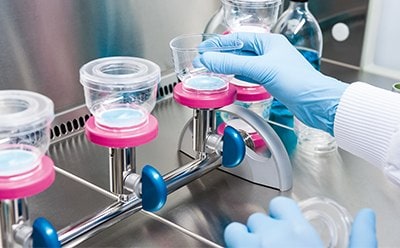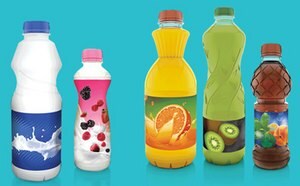Microbial Water Testing

Drinking water is drawn from diverse sources such as public water systems, private wells, or bottled water. Understanding the origin of drinking water, its treatment, and safety for consumption is crucial. While disinfection minimizes the risk of pathogenic infections, it can result in residues and/or byproducts (DBPs) that may endanger human health. Water testing in the food and beverage and pharmaceutical industries is essential to guarantee that water used in production processes, cleaning, drinking and as an ingredient meets safety and quality standards. Accurate and reliable water testing is fundamental in both sectors to maintain regulatory compliance and assure product safety and quality.
Featured Categories
Speed up your time-to-result with rapid microbial testing using our complete membrane filtration systems; used in bioburden testing, food and beverage analysis, and cannabis microbiology testing.
Discover high-quality microbial culture media. Choose from dehydrated or ready-to-use options, meeting industry standards and regulatory requirements.
Explore our wide range of culture media raw materials and supplements for microbiological purposes. All our raw materials and culture media supplements are safe to handle and ensure optimal performance.
Our collection of testing systems includes alternative & rapid culture media for fast & reliable indicator organisms testing results in a time-efficient method.
Water Testing in Food and Beverage Industry
Water is used at multiple stages of food and beverage production, from sourcing raw materials to processing and packaging the final products. Water quality testing is crucial for confirming water cleanliness, detecting, and eliminating harmful microorganisms or chemical contaminants that could undermine the integrity of food and beverages. For food and beverage producers, water quality testing is essential to meet regulations, ensuring product safety and reliability, and building consumer trust.
Periodic qualitative and quantitative assessments are essential to continually monitor the quality of water from different supply sources.
Product Safety: As water is a critical ingredient in food and beverage production therefore testing ensures that it does not introduce harmful contaminants, pathogens, or chemicals into the products.
Compliance with Regulations: Adhering to regulatory standards, such as those set by the FDA, ensures that the water used meets quality and safety requirements, safeguarding consumer health. Hazard Analysis and Critical Control Points (HACCP) regulations require water testing as part of food safety plans.
Quality Control: Routine testing maintains the integrity of the production process, preventing potential issues that could compromise the quality of the final products.
Water Testing in Pharmaceutical and Cosmetic Industry
Water testing is crucial in the pharmaceutical industry due to its extensive use across various stages of product development, from formulation to manufacturing, including as a raw material, an ingredient, or even as part of the final product. Ensuring the quality of water is essential, particularly for products like drugs and cosmetics, which require adherence to stringent pharmacopeial standards.
In the pharmaceutical industry, water must comply with regulatory standards such as those outlined in the United States Pharmacopeia (USP) and the European Pharmacopoeia (EP). A well-designed pharmaceutical water system needs to be validated and continuously monitored to produce high-quality water consistently. This involves system design qualification and effective management of the system.
Regular monitoring and maintenance help mitigate microbiological risks, which can stem from issues in water generation, distribution, or at points of use. Effective water testing and management are vital to prevent contamination and to maintain the integrity and safety of pharmaceutical products.
Similarly, in the cosmetic industry, where water can constitute a significant portion of the formulation, purity is equally critical. The presence of impurities can affect the stability, appearance, and safety of cosmetic products, potentially leading to skin irritations or other adverse effects on consumers. Regular and rigorous water testing ensures that the water used in cosmetics is free from microbiological and chemical contaminants, thereby preserving the quality and safety of cosmetic products.
Visit our document search for data sheets, certificates and technical documentation.
Related Articles
- The EZ Product Family optimizes your microbial testing workflow to deliver reliable and reproducible microbial enumeration test results. The product lineup consists of filtration devices, manifolds, calibrated vacuum sources, and rapid microbial detection platforms.
- Comparison of convenience, operating time, accuracy, costs and safety aspects of single-use funnels vs. reusable funnels for the membrane filtration method in QC microbiology.
- Water source comparison for microbiological media preparation highlights central purification vs. Milli-Q® IX system efficiency.
- S-Pak® membrane filters for microbial bioburden testing
- Updates on ISO standards in food microbiology by expert Barbara Gerten from Merck KGaA.
- See All (0)
Related Protocols
- Routine water and beverage microbiological analysis using the 55-Plus™ Monitor
- MicropreSure® on-line filtration system for in-process microbiology testing
- See All (0)
Find More Articles and Protocols
How Can We Help
In case of any questions, please submit a customer support request
or talk to our customer service team:
Email custserv@sial.com
or call +1 (800) 244-1173
Additional Support
- Calculators & Apps
Web Toolbox - science research tools and resources for analytical chemistry, life science, chemical synthesis and materials science.
- Customer Support Request
Customer support including help with orders, products, accounts, and website technical issues.
- FAQ
Explore our Frequently Asked Questions for answers to commonly asked questions about our products and services.
Related Webinars
This webinar details the updated standards replacing EN ISO 7704:1985 and offers lab solutions to meet the new requirements.
The webinar outlines aseptic media fill principles, Linden Grain Medium handling, LGM usage, and practical tips for optimal sterility test results.
Explore the On-Demand Pharma Microbial QC Webinar Hub for the latest industry insights and regulatory updates—all in one place.
Explore our Food & Beverage Webinar Hub for insights on lab efficiency, microbial analysis, ISO standards, and more in quality control processes.
To continue reading please sign in or create an account.
Don't Have An Account?







